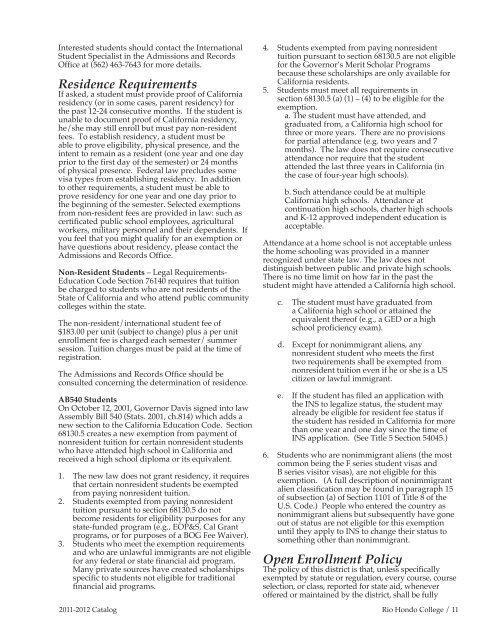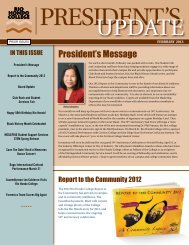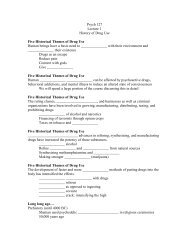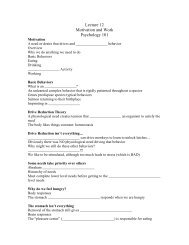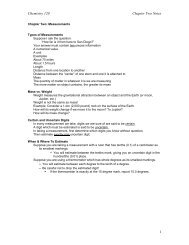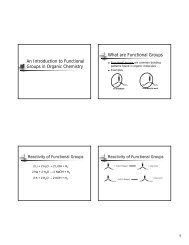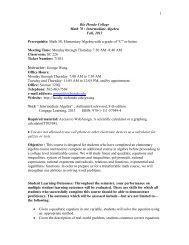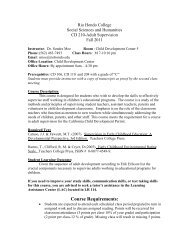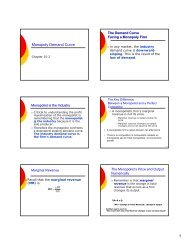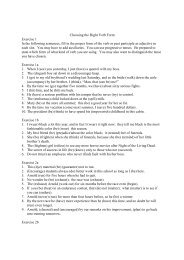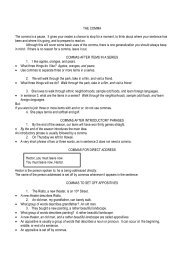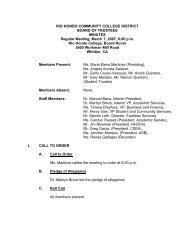Complete College Catalog 2011-2012 - Rio Hondo College
Complete College Catalog 2011-2012 - Rio Hondo College
Complete College Catalog 2011-2012 - Rio Hondo College
Create successful ePaper yourself
Turn your PDF publications into a flip-book with our unique Google optimized e-Paper software.
Interested students should contact the International<br />
Student Specialist in the Admissions and Records<br />
Office at (562) 463-7643 for more details.<br />
Residence Requirements<br />
If asked, a student must provide proof of California<br />
residency (or in some cases, parent residency) for<br />
the past 12-24 consecutive months. If the student is<br />
unable to document proof of California residency,<br />
he/she may still enroll but must pay non-resident<br />
fees. To establish residency, a student must be<br />
able to prove eligibility, physical presence, and the<br />
intent to remain as a resident (one year and one day<br />
prior to the first day of the semester) or 24 months<br />
of physical presence. Federal law precludes some<br />
visa types from establishing residency. In addition<br />
to other requirements, a student must be able to<br />
prove residency for one year and one day prior to<br />
the beginning of the semester. Selected exemptions<br />
from non-resident fees are provided in law: such as<br />
certificated public school employees, agricultural<br />
workers, military personnel and their dependents. If<br />
you feel that you might qualify for an exemption or<br />
have questions about residency, please contact the<br />
Admissions and Records Office.<br />
Non-Resident Students – Legal Requirements-<br />
Education Code Section 76140 requires that tuition<br />
be charged to students who are not residents of the<br />
State of California and who attend public community<br />
colleges within the state.<br />
The non-resident/international student fee of<br />
$183.00 per unit (subject to change) plus a per unit<br />
enrollment fee is charged each semester/ summer<br />
session. Tuition charges must be paid at the time of<br />
registration.<br />
The Admissions and Records Office should be<br />
consulted concerning the determination of residence.<br />
AB540 Students<br />
On October 12, 2001, Governor Davis signed into law<br />
Assembly Bill 540 (Stats. 2001, ch.814) which adds a<br />
new section to the California Education Code. Section<br />
68130.5 creates a new exemption from payment of<br />
nonresident tuition for certain nonresident students<br />
who have attended high school in California and<br />
received a high school diploma or its equivalent.<br />
1. The new law does not grant residency, it requires<br />
that certain nonresident students be exempted<br />
from paying nonresident tuition.<br />
2. Students exempted from paying nonresident<br />
tuition pursuant to section 68130.5 do not<br />
become residents for eligibility purposes for any<br />
state-funded program (e.g., EOP&S, Cal Grant<br />
programs, or for purposes of a BOG Fee Waiver).<br />
3. Students who meet the exemption requirements<br />
and who are unlawful immigrants are not eligible<br />
for any federal or state financial aid program.<br />
Many private sources have created scholarships<br />
specific to students not eligible for traditional<br />
financial aid programs.<br />
4. Students exempted from paying nonresident<br />
tuition pursuant to section 68130.5 are not eligible<br />
for the Governor’s Merit Scholar Programs<br />
because these scholarships are only available for<br />
California residents.<br />
5. Students must meet all requirements in<br />
section 68130.5 (a) (1) – (4) to be eligible for the<br />
exemption.<br />
a. The student must have attended, and<br />
graduated from, a California high school for<br />
three or more years. There are no provisions<br />
for partial attendance (e.g. two years and 7<br />
months). The law does not require consecutive<br />
attendance nor require that the student<br />
attended the last three years in California (in<br />
the case of four-year high schools).<br />
b. Such attendance could be at multiple<br />
California high schools. Attendance at<br />
continuation high schools, charter high schools<br />
and K-12 approved independent education is<br />
acceptable.<br />
Attendance at a home school is not acceptable unless<br />
the home schooling was provided in a manner<br />
recognized under state law. The law does not<br />
distinguish between public and private high schools.<br />
There is no time limit on how far in the past the<br />
student might have attended a California high school.<br />
c. The student must have graduated from<br />
a California high school or attained the<br />
equivalent thereof (e.g., a GED or a high<br />
school proficiency exam).<br />
d. Except for nonimmigrant aliens, any<br />
nonresident student who meets the first<br />
two requirements shall be exempted from<br />
nonresident tuition even if he or she is a US<br />
citizen or lawful immigrant.<br />
e. If the student has filed an application with<br />
the INS to legalize status, the student may<br />
already be eligible for resident fee status if<br />
the student has resided in California for more<br />
than one year and one day since the time of<br />
INS application. (See Title 5 Section 54045.)<br />
6. Students who are nonimmigrant aliens (the most<br />
common being the F series student visas and<br />
B series visitor visas), are not eligible for this<br />
exemption. (A full description of nonimmigrant<br />
alien classification may be found in paragraph 15<br />
of subsection (a) of Section 1101 of Title 8 of the<br />
U.S. Code.) People who entered the country as<br />
nonimmigrant aliens but subsequently have gone<br />
out of status are not eligible for this exemption<br />
until they apply to INS to change their status to<br />
something other than nonimmigrant.<br />
Open Enrollment Policy<br />
The policy of this district is that, unless specifically<br />
exempted by statute or regulation, every course, course<br />
selection, or class, reported for state aid, whenever<br />
offered or maintained by the district, shall be fully<br />
<strong>2011</strong>-<strong>2012</strong> <strong>Catalog</strong> <strong>Rio</strong> <strong>Hondo</strong> <strong>College</strong> / 11


